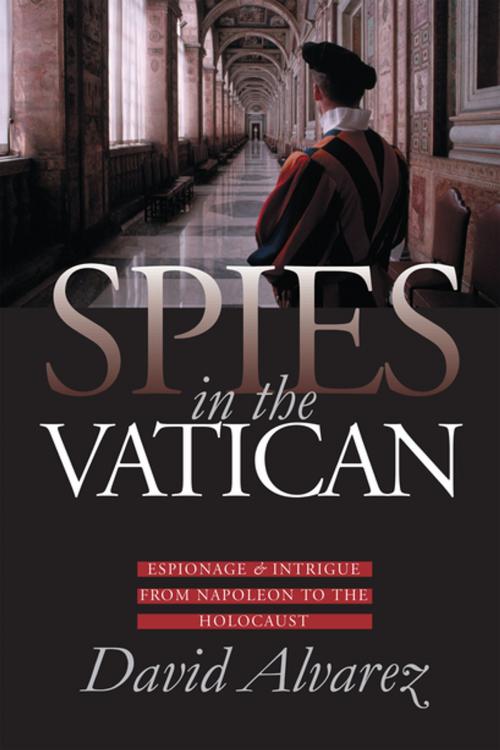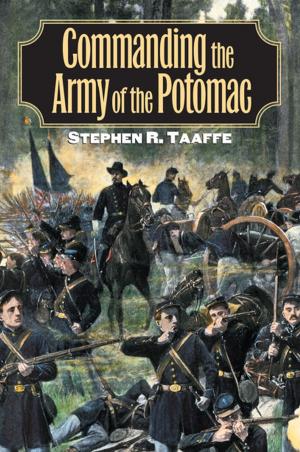Spies in the Vatican
Espionage and Intrigue from Napoleon to the Holocaust
Nonfiction, Religion & Spirituality, Christianity, Church, Church History, Social & Cultural Studies, Political Science, International, International Relations, Denominations, Catholic, Catholicism| Author: | David Alvarez | ISBN: | 9780700622894 |
| Publisher: | University Press of Kansas | Publication: | November 4, 2002 |
| Imprint: | University Press of Kansas | Language: | English |
| Author: | David Alvarez |
| ISBN: | 9780700622894 |
| Publisher: | University Press of Kansas |
| Publication: | November 4, 2002 |
| Imprint: | University Press of Kansas |
| Language: | English |
Revered by millions, the Papacy is an international power that many nations have viewed with suspicion, some have tried to control, and not a few have spied upon. Ranging across two centuries of world history, David Alvarez’s fascinating study throws open the Vatican's doors to reveal the startling but little-known world of espionage in one of the most sacred places on earth.
Reviewing the pontificates of ten popes—from Pius VII, Napoleon’s nemesis, to Pius XII, maligned by some as “Hitler’s pope”—Alvarez provides the first history of the intelligence operations and covert activities that reached the highest levels of the Vatican. Populated with world leaders, both famous and infamous, and a rogue’s gallery of professional spies, fallen priests, and mercenary informants, his work casts a bright light into the darker corners of papal history and international diplomacy, a light that often sparkles with a witty appreciation of the foibles of the espionage trade.
Alvarez reveals that the Vatican itself occasionally entered this clandestine world through such operations as a network of informants to spy on liberal Catholics or a covert mission to establish an underground church in the Soviet Union. More frequently, however, the Vatican was the target for hostile intelligence services seeking to expose the secrets of the Papacy. During World War I, for example, Pope Benedict XV’s personal assistant was a secret German agent. During World War II, Germany, Italy, Russia, and the United States sent spies into the Vatican to discover the pope’s intentions. The Nazis were especially resourceful, securing the services of apostate priests, such as Herbert Keller, an unscrupulous monk who exposed Pope Pius XII’s involvement in a plot against Hitler, and devising a plan to establish a “seminary” in Rome with agents posing as student priests. Alvarez recounts these operations and many more, including the methods by which the Vatican learned about the Holocaust.
Based on diplomatic and intelligence records in Britain, France, Italy, Spain, the United States, and the Vatican—with the latter including documents sealed after the author had access to them—Spies in the Vatican reveals that the Papacy often was hindered by its inability to collect timely and relevant intelligence and that it made little effort to improve its intelligence capabilities after 1870. Challenging the long-held notion that the pope is the world's best-informed leader, Alvarez illuminates not only the inner workings of the Vatican but also the global events in which it was inextricably involved.
Revered by millions, the Papacy is an international power that many nations have viewed with suspicion, some have tried to control, and not a few have spied upon. Ranging across two centuries of world history, David Alvarez’s fascinating study throws open the Vatican's doors to reveal the startling but little-known world of espionage in one of the most sacred places on earth.
Reviewing the pontificates of ten popes—from Pius VII, Napoleon’s nemesis, to Pius XII, maligned by some as “Hitler’s pope”—Alvarez provides the first history of the intelligence operations and covert activities that reached the highest levels of the Vatican. Populated with world leaders, both famous and infamous, and a rogue’s gallery of professional spies, fallen priests, and mercenary informants, his work casts a bright light into the darker corners of papal history and international diplomacy, a light that often sparkles with a witty appreciation of the foibles of the espionage trade.
Alvarez reveals that the Vatican itself occasionally entered this clandestine world through such operations as a network of informants to spy on liberal Catholics or a covert mission to establish an underground church in the Soviet Union. More frequently, however, the Vatican was the target for hostile intelligence services seeking to expose the secrets of the Papacy. During World War I, for example, Pope Benedict XV’s personal assistant was a secret German agent. During World War II, Germany, Italy, Russia, and the United States sent spies into the Vatican to discover the pope’s intentions. The Nazis were especially resourceful, securing the services of apostate priests, such as Herbert Keller, an unscrupulous monk who exposed Pope Pius XII’s involvement in a plot against Hitler, and devising a plan to establish a “seminary” in Rome with agents posing as student priests. Alvarez recounts these operations and many more, including the methods by which the Vatican learned about the Holocaust.
Based on diplomatic and intelligence records in Britain, France, Italy, Spain, the United States, and the Vatican—with the latter including documents sealed after the author had access to them—Spies in the Vatican reveals that the Papacy often was hindered by its inability to collect timely and relevant intelligence and that it made little effort to improve its intelligence capabilities after 1870. Challenging the long-held notion that the pope is the world's best-informed leader, Alvarez illuminates not only the inner workings of the Vatican but also the global events in which it was inextricably involved.















